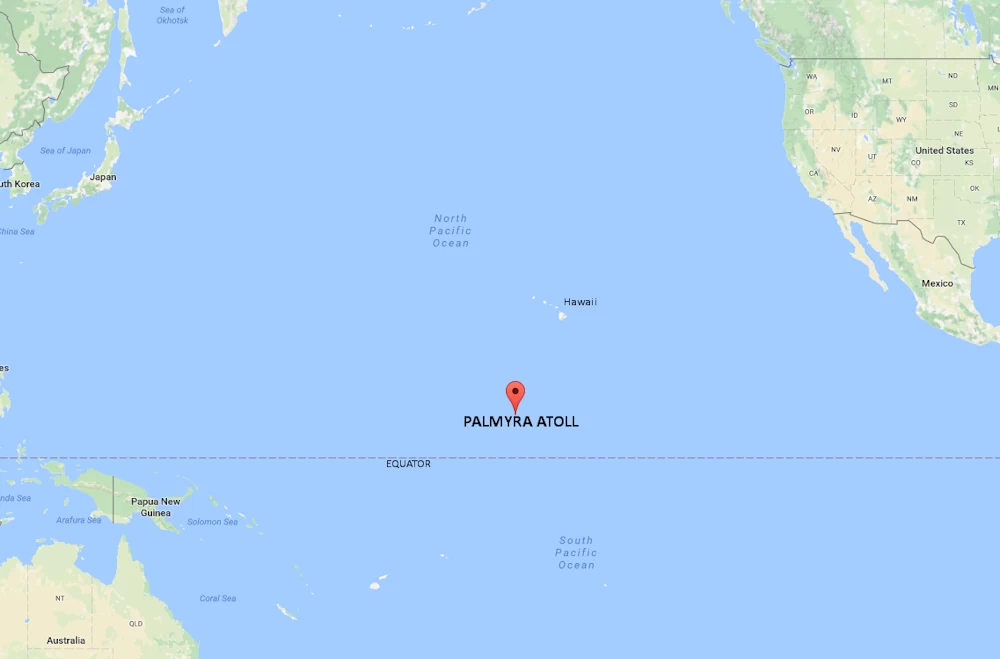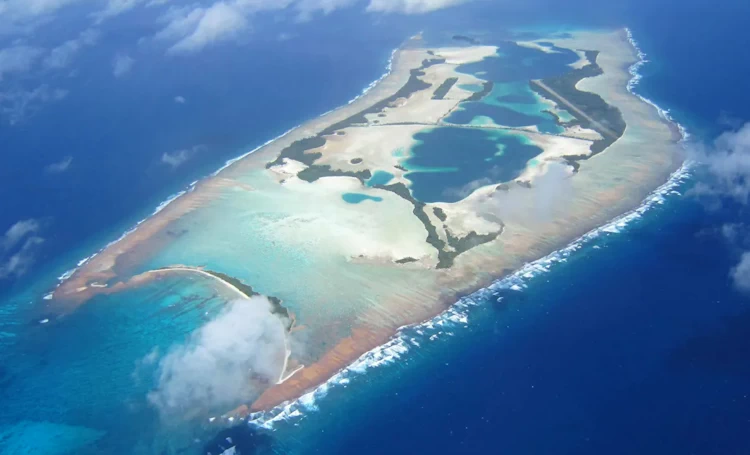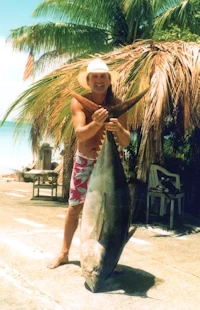

Roger Lextrait was the last resident and caretaker of the Palmyra Atoll before it was sold to the Nature Conservancy. He had previously managed a successful restaurant in Oregon. He now lives in Florida and is working on a personal memoir. This article originally appeared on the NBC News website in December 2020.
Before I went to the Palmyra Atoll in 1992, I had been traveling all over the world on my boat, mostly by myself. When I got back to Hawaii, I was so lost; I had nothing to do. But then, the owner of the island approached me and asked if I would go out there and be the manager — it was a new thing for him, because people had been going to the island without his permission and then, if they had trouble, suing him when they got back to Hawaii. He wanted to make everyone who went sign a list of rules and regulations, to acknowledge that they were there at their own risk and to pay $5.
I said, "Wow, let me think about it," because there were a lot of things I had to consider. So I thought about it, and I went back to him and said: "OK, I'll do it. I'll do it for one year."
Why did I do that? Mostly because I wanted to get away from the unnecessary complication of modern life. I wanted to be close to nature and to have absolutely no human beings around me — just to see whether I could do it. It was like a challenge; I wanted to try something completely new.
But I did eight years on Palmyra, because magic things happen there.
It was a huge project to get ready. What I did first was that I went to the animal shelter and I got a dog, a German shepherd I named TouTou. I knew that, if I got very lonely, I would have the animal; it's very, very good for you. And I had a 50-foot boat, so I could put lots and lots of stuff on it — which was good, because Palmyra is so remote, and there is nobody around. I was going to be in the middle of the Pacific, so I had to plan things very well. I knew it was not going to be easy.
When I first got to the island, there was nothing — so I had to build anything I needed. During World War II, Palmyra had been a refueling station for the U.S. Navy, and 6,000 people were stationed there. There had been housing and everything, but when I arrived, there was almost nothing left, because nature affects everything. Everything was wood, and much of it had rotted away.
But with some of the old wood that was still in decent shape, I built two very simple, nice houses. I used an old concrete building, set deep into the ground, with a steel roof, and made it into a water holding tank and then, with a bathtub I found sticking out of the mud in the jungle, I made a shower. Part of that came from my need to fight loneliness; I felt a need to build things.
It was sometimes very difficult to be alone — try to imagine you're in the middle of the ocean; there's nobody around for 1,000 miles. Sometimes the loneliness would just attack me.
The way I fight loneliness is to get busy. I would exercise. I went diving every day — I dove with dolphins and with manta ray. On Palmyra, the fish will come right to your face to look at you. Nothing there has ever been touched; it is pristine. Under the water is like another world; it is so beautiful. That was one way I took my loneliness out.
Plus, as I said, I had my dog, TouTou; every morning, the dog and I would go fishing. And later a friend who was up on Fanning Island — I had some friends there; it's about 400 miles away from Palmyra, and there are Gilbertese people who live there — called me and asked, "Do you need something?" I said, "If they have older dogs and cats, please, bring me some." So he brought me a dog and a cat. In the end, I had three dogs, two cats and 100 chickens. (I built a chicken house for them and used old toilet seats from the naval base for their nests. I got about 25 eggs a day.)
Sometimes I would take my little sailing dinghy and go out of the island. (I had an anchor inside with a lot of line and a little chain on it, because if something happened, I could be going out and not be able to be back.) And when I would take my dinghy and go out around the island, you know what? The bottlenose dolphin would follow me, go under my boat and jump in the air. It was incredibly beautiful to do things like this.
Also, I had a radio contact every day at 5 p.m. with Hawaii — a friend of mine — who could tell me if somebody was coming to visit the island. Most of the time in Palmyra, of course, nobody came: I only had two or three months during which people came. The rest of the time, nobody sailed in our direction because of the hurricane season in the north and the south.
But sometimes, I did have some visitors, and when they came from Hawaii, they had to get in touch because they needed to pay and sign that they understood the rules and regulations. They would also ask, "What do you need, Roger?" I always told them, "Bring me a huge sack of onions, a huge sack of potatoes, garlic, one bottle of rum, one case of wine," and that would give them two or three weeks free at the island. In eight years, I didn't run out of potatoes, garlic and onions.
I had a very famous cocktail in those days, which I would drink every day at 5 p.m.: It was made of wine, rum and Tang. After that, I would go with my dog — or, at the end, my three dogs — and chase the rats. There were a lot of rats there; the dog was so good at it. Then sometimes I would go to sleep on my boat, or sometimes I would sleep in the room that I built.
Sometimes, when I was alone for long periods, I'd get a little bit wild. I would not put shoes on. I acted like an animal with my dog. I wouldn't wear clothes. Sometimes I went four or five months and never put on clothes. Sometimes I got so very wild the dog challenged my authority.
I wanted to get away from civilization, from people, and be very close to nature, and I did it. At the end, I was very, very, very happy. I was so happy.
When I left Palmyra for good in 2000, though, I had a very hard time readapting to civilization. I went back to Hawaii, and I saw a guy going by on a bicycle and talking on the phone — but I had no idea that cellphones even existed. I couldn't believe the fast pace of society; it was too fast. Nobody has time.
And after Palmyra, I did not like to be alone anymore. Eventually, though, I met my wife, and, after that, I was good.
I believe we are so privileged to be alive and to get to go see how the other people live around this little planet. I don't know why I am here, but I am very, very privileged to be alive. It's nice to go see how other people live, how the other cultures do things. But in the grand scheme of things, we are absolutely nothing in the universe.

Palmyra Atoll from the air

Roger Lextrait on Palmyra Atoll